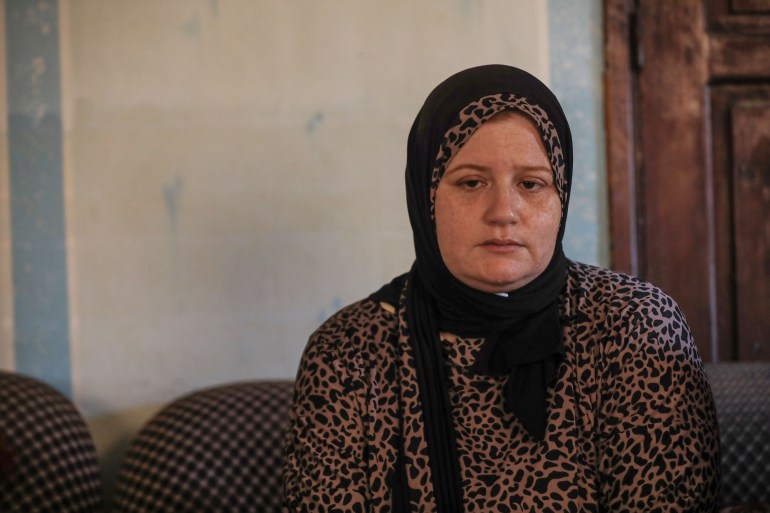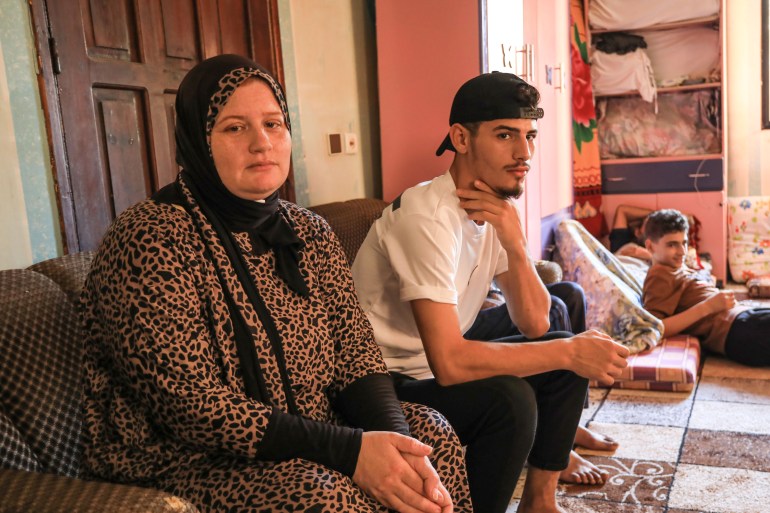‘Losing my mind’: Israel army stripped two Gaza brothers, released only one
Deir el-Balah – Most of these days, Khader al-Saeedi wants to crawl out of his skin, tormented by the images of the last time he saw his brother, Mohammed.
“I feel like I’m losing my mind,” Khader, a 21-year-old fisherman said.
The two brothers were walking with their family along the so-called “safe passage” that Israeli forces told Palestinians in northern Gaza and Gaza City to take to flee south.
But a short distance from Wadi Gaza, they found dozens of Israeli army tanks flanking the Salah al-Din Road — Gaza’s main highway — with some snipers standing on top.
“You there! The one with the blue bag! Come here,” one of the soldiers shouted at Mohammed.
The soldier then ordered Khader to do the same. Khader walked towards the soldiers, following his brother, raising his ID in one hand.
“They told me to strip, so I took off my clothes,” Khader said. “They forced me to empty the bag of clothes that I was carrying, as well as the blue bag that Mohammed had. Then they ordered me to raise my arms, turn this way and that.”
The soldiers told Mohammed, 18, to do the same. There was a third man with them who was also singled out from the crowd, and he too had to strip down to his underwear.
“My brother wasn’t scared of the soldiers, which annoyed them a lot,” Khader said. “They snapped at the way he was walking, almost like he was sauntering, and said: ‘Do you think you are in your schoolyard? Come here.’”
Mohammed was taken to the other side of the trench, hidden from view. The soldiers then told Khader to get dressed.
“They told me I had 10 seconds to pack up the bags but I got nervous and said I don’t want the clothes any more,” Khader said. “One of the soldiers pointed his gun at me, and pulled his finger on the trigger. I hurried to gather what I could in my arms and turned to join the rest of the moving crowd.”
It was the last time he would see Mohammed.
For half an hour, Khader walked in his underwear, until he caught up with his mother Ola, who had become faint with worry.
‘I didn’t want to leave’
Three days earlier, on Friday, October 13, Ola’s brother Izzat had visited their house in the Shati refugee camp, west of Gaza City. A few hours after he left, Ola received the news that her brother had been killed in an Israeli air attack.
“I spent four hours looking for his body at the morgue with my son Mohammed,” Ola, 41, said. “We managed to bury him the next day.”
That day, as relatives gathered in Ola’s house to pay their respects, the bombings around them grew more intense and closer. They decided to move to Ola’s brother-in-law’s apartment on the ground floor,
But a few minutes later, the bombardment reached them.
“I just remember something heavy falling on us,” Ola said. “It was chaos. I crawled on my hands and knees to get out, barefoot. I saw one of my sons Khader, and told him to find his siblings and get out.”

Ola’s nephew Ali, Mohammed’s cousin and best friend, was killed. Her sister’s husband was brain dead and died in hospital a few hours later. Most of the residential square they were living in had been destroyed.
The extended family – numbering more than 100 – spent that night at al-Shifa Hospital, sleeping first by the morgue. But when the Israeli warplanes targeted the solar panels on the hospital’s rooftops, terrorising the tens of thousands of displaced families there, Ola’s husband decided to move the family south.
“I didn’t want to leave, and neither did Mohammed, who wanted to stay in the hospital and volunteer as a medic,” Ola said. “But we had buried four members of my family in two days, and our home is destroyed.”
The family, along with Ola’s elderly mother-in-law Aida, piled into their car and drove to get closest to the “safe passage”.
“Mohammed sat in my lap and I whispered to him not to be rash because he didn’t want to leave,” Ola said. “He smiled and replied, ‘as long as you’re okay I’ll be okay.’”
They parked the car and joined the thronging crowds on Salah al-Din Road, but immediately got separated, with Ola’s husband walking at his mother’s slow pace some distance behind them.
The crowd kept moving, as Israeli soldiers would randomly order people to come to them and threatened everyone else to keep walking, their eyes straight ahead, or else.
When the soldiers ordered her two sons to step towards them, Ola froze. Other people pushed past her, warning her to keep moving or otherwise risk getting shot at. One woman snapped at Ola that she was causing them harm.
“I told them I can’t just go on when my two boys have been taken!” Ola said. “We had seen a man stripped to his underwear collecting his clothes and I thought that that’s what the Israelis would do to my sons, just to humiliate them. I didn’t know what to do, how is a mother supposed to act in this situation?”

Bullets in response to a grandmother’s plea
Ola and her daughters walked slowly, risking a furtive glance here and there. When Khader finally caught up with them, Ola wrapped him in one of his sister’s long coats.
The third man who was detained with the brothers was released and found Khader, telling him not to worry and that after handcuffing, blindfolding and interrogating him, the soldiers said Mohammed would be released soon.
“We waited on the road for an hour but there was no sign of him,” Khader said. It was at this point that his father and grandmother Aida caught up with them. When she found out what happened, the 70-year-old doubled back to where the Israeli tanks were stationed, and holding her white scarf in one hand, she sat down between two tanks and refused to budge until Mohammed was released. She screamed at the soldiers, cried and begged the soldiers to return her grandson.
“She said she is not scared of being killed, even as people tried to get her to leave, saying she will be shot at,” Khader said. “After an hour, the snipers started shooting, forcing people to throw themselves on the ground.”
Reluctantly, Aida began to walk again, going extra slow until the sun set.
After walking for 12km (7.5 miles), the family arrived in Maghazi camp dazed, not quite believing what had happened. They called the Red Cross many times, giving their testimonies and Mohammed’s details.
According to various testimonies from displaced Palestinians who used the “safe passage”, hundreds of Palestinian men – and to a lesser extent some women and children – have been arrested at Israeli checkpoints, kidnapped and taken to unknown places.
Last month, Palestinian poet Mosab Toha was among those fleeing northern Gaza and was kidnapped by Israeli forces. According to human rights lawyer Diana Buttu, Toha was taken to a prison in the Naqab (Negev) desert where he was interrogated and beaten along with 200 men kidnapped from Gaza. Toha was released a day later.
Hisham Mhanna, the spokesperson for the International Committee for the Red Cross, told Al Jazeera that the organisation receives a lot of phone calls from families informing them of their missing or detained relatives.
“We take the information of the person detained, and we communicate with the Israeli side to see where they are held,” he said, not disclosing the number of calls received from people referring to the ‘safe passage’.
“If we have any information from the Israeli side, we usually share that to the family directly, not to the media,” he added.

“We think the soldiers took him to be tortured and used as a human shield,” Ola said, beginning to cry softly. “I wish we never left the hospital. I feel like I’ve handed over my son to the Israelis.”
She took a deep breath.
“Mohammed is brave,” she said. “Before we got displaced, he was always at the forefront of helping people in Shati, rescuing families under the rubble, and giving first aid to the injured.”
The family are currently staying at a relative’s house in Deir el-Balah, and almost two months later, have no idea whether Mohammed is alive or dead.
“I thought the soldiers wanted to search my boy, not to kidnap him,” Ola said. “I’m scared they killed him and left his body on the road, like the bodies of other people we saw. Dead horses, burned-out cars, suitcases and bags and money on the ground. No one could pick up anything or anyone on the ground otherwise they would be shot by the soldiers.
Not knowing what happened to Mohammed is killing the family inside out. They no longer believe each other when they try to comfort themselves, saying he’ll be okay.
“It’s not like when the Israelis kidnap the fishermen on a normal day and they get returned by the Red Cross after a few days,” Ola said. “I can’t sleep. I barely eat. How can I, if I don’t know whether my son is sleeping or eating or even alive?”




